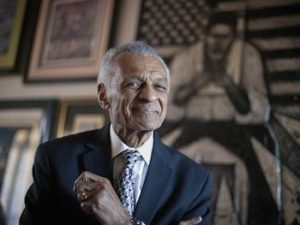
C.T. Vivian
*C. T. Vivian was born on this date in 1924. He was a Black minister, author, and activist.
Cordy Tindell Vivian was born in Boonville, Missouri. As a small boy, he migrated with his mother to Macomb, Illinois, where he attended Lincoln Grade School and Edison Junior High School. Vivian graduated from Macomb High School in 1942 and attended Western Illinois University in Macomb, where he worked as the sports editor for the school newspaper.
His first professional job was as recreation director for the Carver Community Center in Peoria, Illinois. Vivian participated in his first sit-in demonstrations, successfully integrating Barton's Cafeteria in 1947. Studying for the ministry at American Baptist College in Nashville, Tennessee, in 1959, Vivian met James Lawson, who was teaching Mohandas Gandhi's nonviolent direct-action strategy to the Nashville Student Movement. Soon, Lawson's students, including Diane Nash, Bernard Lafayette, James Bevel, John Lewis, and others from American Baptist, Fisk University, and Tennessee State University, organized a systematic nonviolent sit-in campaign. On April 19, 1960, 4,000 demonstrators marched on City Hall, where Vivian and Diane Nash challenged Nashville Mayor Ben West. As a result, Mayor West publicly agreed that racial discrimination was morally wrong.
Many students participating in the Nashville Student Movement soon took on significant leadership roles in the Student Nonviolent Coordinating Committee (SNCC) and the Southern Christian Leadership Conference (SCLC). In 1961, Vivian participated in Freedom Rides. He worked alongside Martin Luther King Jr. as the national director of affiliates for the SCLC. During the summer following the Selma Voting Rights Movement, Vivian conceived and directed an educational program, Vision, and put 702 Alabama students in college with scholarships (this program later became Upward Bound). His 1970 Black Power and the American Myth was the first book on the Civil Rights Movement by a member of Martin Luther King's staff.
In the 1970s, Vivian moved to Atlanta and, in 1977, founded the Black Action Strategies and Information Center (BASICS). In 1979, he co-founded, with Anne Braden, the Center for Democratic Renewal (initially as the National Anti-Klan Network). In this organization, blacks and whites worked together in response to white supremacist activity. In 1984, he served in Jesse Jackson's presidential campaign as the national deputy director for clergy. In 1994, he helped to establish and served on the board of Capital City Bank and Trust Co., a black-owned Atlanta bank. He served on the board of Every Church, a Peace Church.
Vivian was featured as an activist and an analyst in the civil rights documentary Eyes on the Prize. She was the focus of the biography Challenge and Change: The Story of Civil Rights Activist C.T. Vivian by Lydia Walker. In 2008, Vivian founded and incorporated the C. T. Vivian Leadership Institute, Inc. (CTVLI) to "Create a Model Leadership Culture in Atlanta," Georgia. The C. T. Vivian Leadership Institute conceived, developed, and implemented the "Yes, We Care" campaign on December 18, 2008 (four days after the City of Atlanta turned the water off at Morris Brown College (MBC) and, over two and a half months, mobilized the Atlanta community to donate more than $500,000 directly to Morris Brown as "bridge funding." This effort saved this Historically Black College or University (HBCU) and allowed the college to negotiate with the city, ultimately restoring the water services to the college.
In 2013, President Barack Obama named Vivian as a recipient of the Presidential Medal of Freedom. Vivian continued to reside in Atlanta, Georgia, and founded the C. T. Vivian Leadership Institute, Inc. He was a member of the Alpha Phi Alpha fraternity. C. T. Vivian died on July 17, 2020, in Atlanta at 95.